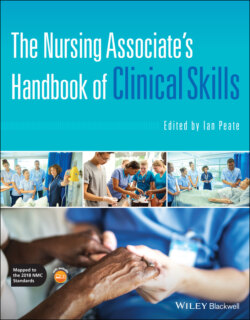Читать книгу The Nursing Associate's Handbook of Clinical Skills - Группа авторов - Страница 204
Blue Flag
ОглавлениеNursing associate Lilly Myers is caring for a patient named Renuka in her own home. She had been off duty for three days; she looks at Renuka’s care plan and the documentation written by staff nurse Willis who had been caring for her over the previous three days and notices that the staff nurse has forgotten to sign the various entries she has made in Renuka’s nursing notes, in fact all of them. Lilly calls staff nurse Willis who is office based and explains the situation to her. Staff nurse Willis requests, ‘please can you sign the entries for me and when I get back off leave in two weeks I will counter sign’. Lilly refuses, and staff nurse Willis says in a rather harsh tone, ‘that is the last time I do you any favours, any way I am on leave now’. How do you think Lilly should proceed?
When the nursing associate is undertaking a programme of education leading to registration and is completing clinical learning outcomes during a clinical placement, it is important that only the allocated mentor or practice supervisor signs off the clinical learning outcomes as they are completed. The situation may arise where the student and the mentor discuss a clinical learning outcome, but then, the mentor forgets to sign. This is a form of record, as indicated by the NMC, which does not directly relate to patient care; however, this record does enable the student to progress to registration and then directly affect patient care. Therefore, it is essential that the student does not falsify this signature in this situation but requests the mentor to complete the record at their next meeting.
Section 10 requires that each nursing associate attribute any entry that they make in any paper or electronic records to themselves, in essence they own that entry. This is linked to the previous practical action very closely. If the record is paper based, then it is essential that the signature (or initials on certain records) is clearly identifiable and consistent. In many clinical areas, a register will need to be completed which allows the nursing associates to first clearly write their name and then adjacent to this enter a specimen of both their signature and their initials (see Figure 8.1).
This is a particularly useful approach to accountable record‐keeping when looking at records historically and examining records that have been made by agency or bank staff that may have only made a limited number of entries and indeed their signatures alone are not familiar.
If the record is made electronically, then it is essential that it be ‘signed’ by the correct author. This will require healthcare professionals to log off a computer and then log in with their own identity before making an entry; otherwise, the entry will be attributed to the healthcare professionals who have already logged into that recording device. While this signature or identity may not be seen by the individual making the entry, the computer system will record who was logged in as the person making the entry. This reinforces the importance of logging off from any device after a record has been made and also that the login details are not shared with another nurse or nursing associate so that any record subsequently made is attributed directly to the nursing associate who is identified as being logged on to the recording device.
Figure 8.1 An example of a specimen register used in a general practice.
One of the final subsections within Section 10 requires the nursing associate to make sure that all records are clearly written, dated and timed, and that they do not include unnecessary abbreviations, jargon or speculation. As this subsection contains detailed guidance for record‐keeping, this will be now discussed in several sections. These requirements of the NMC Code are also echoed by the NMC proficiency standards (2018) that state that records are to be written accurately, clearly and legibly. Accuracy and clarity are quite inseparable. The nursing associates must also remember that there will be quality standards in their workplace that will govern how they are required to undertake documentation; they must not deviate from these standards.
